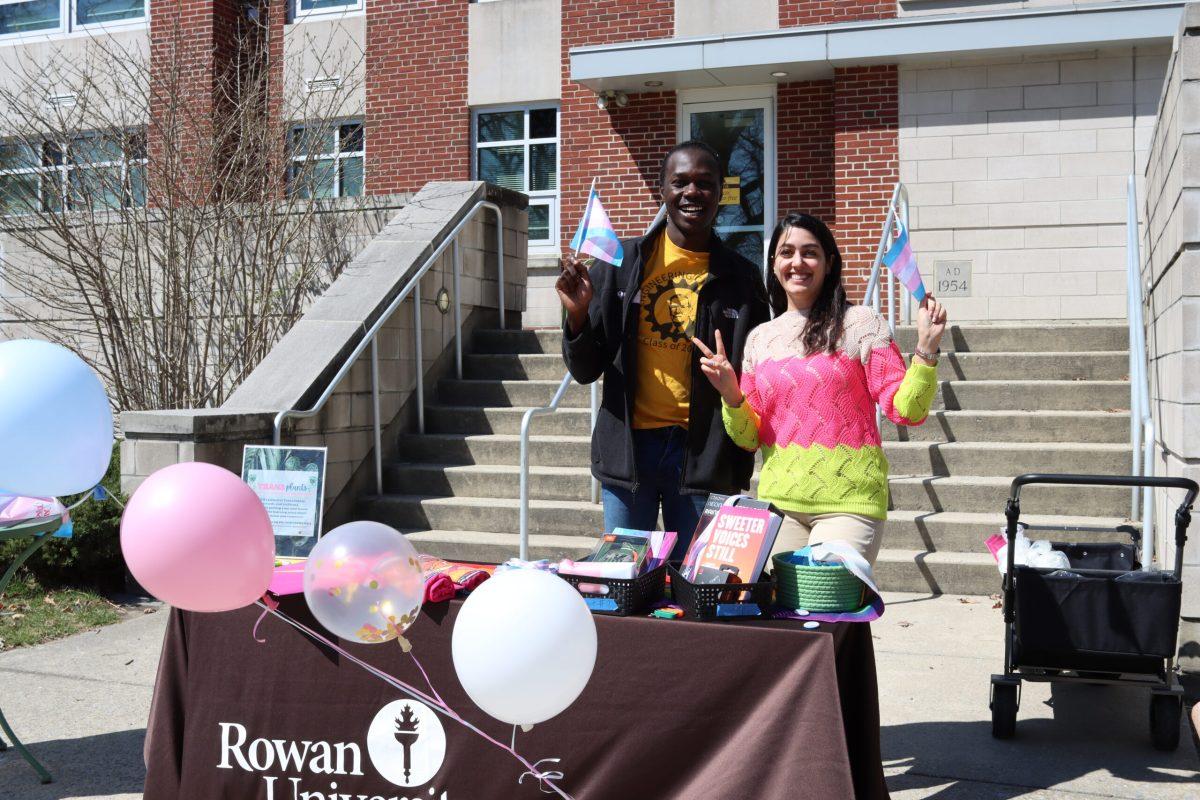Transgender Day of Visibility, recognized annually on March 31, is a day to celebrate and honor transgender people and bring awareness to triumphs and struggles within the trans community. The day of recognition was created in 2009 by Rachel Crandall, who wanted the trans community to have a day of celebration in addition to Transgender Day of Remembrance. Transgender Day of Remembrance, recognized annually on November 20, remembers victims of anti-trans violence.
On Friday, March 29, Rowan’s Office of Social Justice, Inclusion, and Conflict Resolution (SJICR) hosted “Transgender Day of Visibility,” in which students and staff gathered to commemorate the day. The sun shined down as students got together outside of Hawthorne Hall to celebrate transgender lives and pot plants while engaging in discussion surrounding trans activism.
At the welcome table for the event, student workers handed out transgender pride flags, pins, and lanyards to fellow students. T-shirts with legendary trans activist Marsha P. Johnson, tuck kits, books, Bluetooth speakers, and so much more were also raffled off to participants at the event. Everyone was encouraged to sign a flag in solidarity with the trans community.
Erwin Wambi, a junior computing and informatics major with a concentration in social justice and management information systems, shared what Transgender Day of Visibility means to him.
“It means to me that trans individuals, not only on our campus but worldwide, can come together to acknowledge the trans movement and the progress that has been made,” said Wambi.
Wambi shared his belief that transgender students need to be more recognized in academia for it to be more inclusive.
“A lot of majors we have, a lot of courses we take here, they kind of don’t acknowledge the fact that other identities exist,” said Wambi.
Atefeh Hamedi, a diversity, equity, and inclusion master’s student and graduate coordinator for SJICR, shined a light on the different ways the SJICR is attempting to rectify the disparities that trans students face in the academic setting.
“In the SJICR, we have a lot of different programs. We have trans-body-positive weekly programs in collaboration with the wellness center. We have queer collective bi-weekly meetings here and different centers for gender and sexuality. For gender and sexuality minorities, it’s a safe space to gather, rest, and be exactly who they are,” said Hamedi.
Hamedi spoke about the need for further outreach within the Rowan community, stating a need for more staff, a higher budget, and more outreach for social justice programs and initiatives.
“We try our best to advertise our events, our programs for trans people, but the participation is not that high,” said Hamedi.
The hope is that with more involvement and support from the community and university, the SJICR will be able to reach Rowan students who can benefit from their programs. For LGBTQ+ students at Rowan, a home can be found in the SJICR.
For comments/questions about this story DM us on Instagram @thewhitatrowan or email [email protected]
























































































































































!["Working with [Dr. Lynch] is always a learning experience for me. She is a treasure,” said Thomas. - Staff Writer / Kacie Scibilia](https://thewhitonline.com/wp-content/uploads/2025/04/choir-1-1200x694.jpg)









































